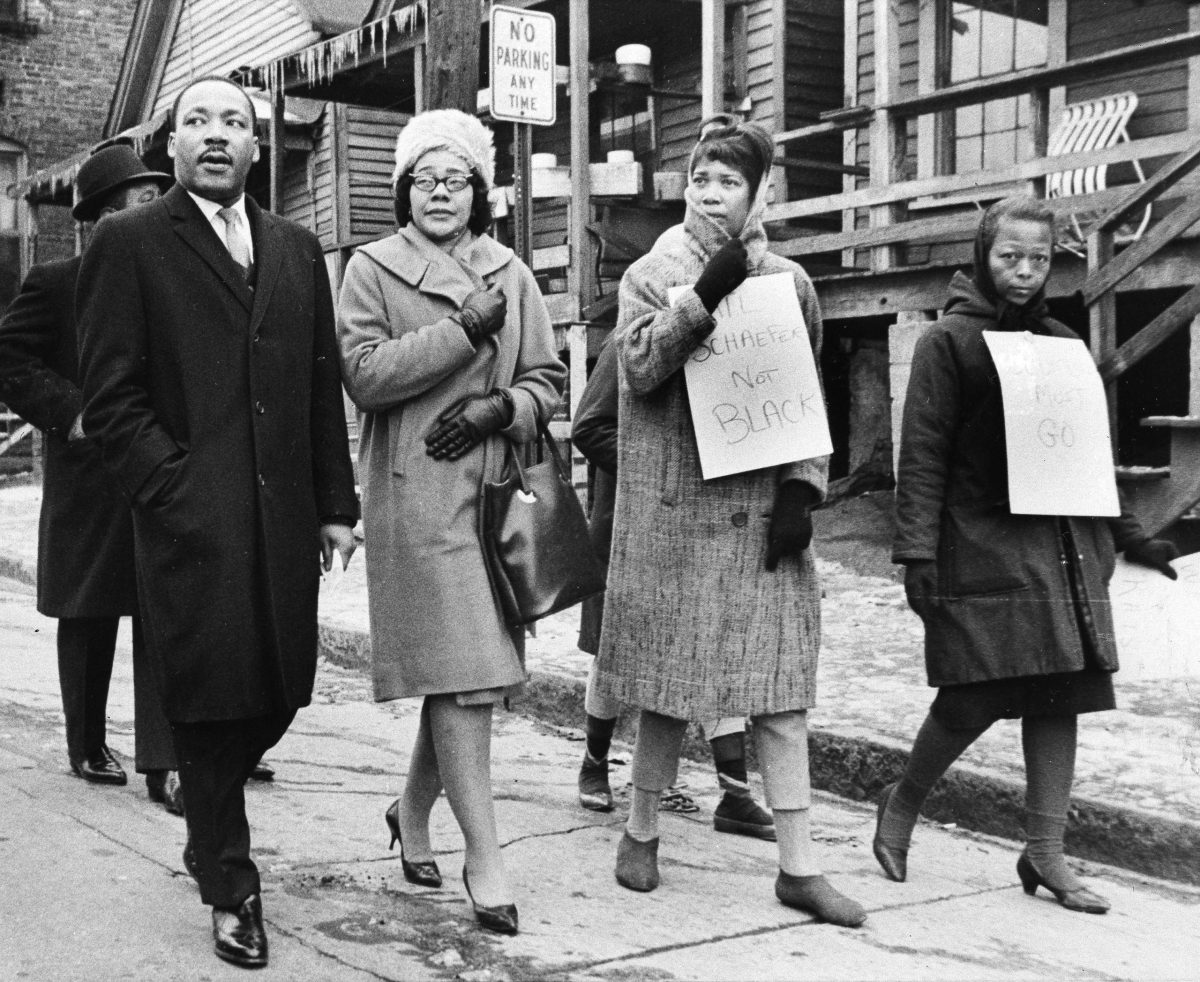We frequently envision Dr. Martin Luther King Jr.’s famous speeches and his unshakable dedication to equality and justice. However, a strong group of women worked behind the scenes during the Civil Rights Movement, and their efforts were crucial to the movement’s advancement. Women like Coretta Scott King, Ella Baker, and Diane Nash were the backbone of the movement, guaranteeing that Dr. King’s goal could come to life through organizing marches and spearheading local campaigns.
Dr. Malachi D. Crawford, PhD, an associate professor of history at Prairie View A&M University, stated that despite their crucial significance, African American women’s contributions to the Civil Rights Movement have long been disregarded. These women were powerful leaders whose vision changed the movement’s tactics, not just organizers or members.
During this time, women’s contributions were mostly overlooked, even at Dr. King’s famous I Have a Dream address at the March on Washington. Many, including King, Baker, and Nash, refused to back down from the battle in spite of that slight. In all of the major campaigns, African American women served and led in various capacities, including field secretaries, lawyers, litigants, organizers, and educators. Why, therefore, were their stories left out of the first historical narratives of the movement?
According to Crawford, civil rights lawyer Pauli Murray, a graduate of Howard University Law School, was instrumental in honing the legal arguments that eventually resulted in the historic ruling in Brown v. Board of Education (1954). Similarly, the student-driven activism phase of the movement was shaped by Ella Baker’s advocacy, which enabled African American youngsters to speak up and challenge the authority of older, more established leaders. Although it is impossible to say whether having more women in leadership positions would have accelerated progress, their impact surely expanded the reach of civil rights victories.
Women were among King’s closest advisors and driving forces behind national civil rights organizations.For instance, veteran educator Septima Clark’s excellent organizing abilities were crucial to voter registration, literacy instruction, and civic education.King presided over the Southern Christian Leadership Conference, of which Dorothy Cotton was a member of the inner circle. She taught nonviolent resistance and provided literacy instruction.
According to academics and historians, the Black independence struggle would not have been without Black women, and more advancement might have been possible if the males had allowed them to lead.
According to Naomi Washington-Leaphart, an adjunct professor of theology and religious studies at Villanova University, the Civil Rights Movement would not have succeeded without our efforts. King was challenged to think more deeply by women. King was considered responsible by women. And after his death, ladies carried on the work.
Women are still carrying on that tradition today, advocating for justice and equity in Houston and elsewhere. The ladies in our own community who represent Dr. King’s vision and uphold his dream must be honored as we commemorate his life and contributions.
These women, who frequently go unnoticed, continue Dr. King’s legacy by bravely and resolutely facing contemporary issues. Here are a few remarkable women who continue to have a significant influence on the continuous fight for equality, both as local heroes and as national leaders.Here are some trailblazers who are changing things:
Local
Melanie Johnson, M.D.
Johnson is a visionary leader tackling educational disparities in Houston as the president and chief executive officer of the Collaborative for Children. By offering tools, training, and creative initiatives that empower educators, parents, and caregivers in marginalized communities, her organization is committed to enhancing early childhood education. Johnson understands that ending cycles of poverty and structural injustice requires having access to high-quality education.
Johnson is a leader and a member of the City of Houston’s Adult Advisory Board, where she supports programs and policies that advance inclusion and equity. Her writings are a reflection of Dr. Martin Luther King Jr.’s conviction that education can be a powerful instrument for social transformation and emancipation. By guaranteeing that every child, irrespective of their background, has the chance to flourish, Dr. Johnson is preserving Dr. King’s vision of justice and equality.
Nelson, Dr. Bakeyah
Nelson is leading the city’s battle for environmental justice as the Executive Director of Air Alliance Houston. Her research focuses on how air pollution disproportionately affects underprivileged communities, especially in Houston’s traditionally underprivileged neighborhoods. Under her direction, Air Alliance Houston carries out community involvement, policy advocacy, and research to enhance air quality and lessen the inequities in public health brought on by environmental injustices. Nelson’s work emphasizes the connection between civil rights and environmental issues, highlighting the fact that a healthy environment and clean air are essential human rights. She supports Dr. King’s vision of justice, which includes social and environmental equality, by elevating the voices of communities who are frequently left out of environmental decision-making processes. Dr. King’s vision of a society free from the shackles of structural injustice is being advanced by Nelson’s commitment to building a healthier, more just Houston.
Webber, Kandice
A passionate advocate for civil rights and social justice in Houston, Kandice is the organizer of the March for Black Women and a leader within Black Lives Matter Houston, Webber tirelessly champions the rights and dignity of Black communities. In addition, she founded Houston Rising, a group devoted to resolving structural injustices and elevating the voices of underrepresented groups. Dr. Martin Luther King Jr.’s ideas of equality, justice, and group empowerment are embodied in her work. Through organizing protests, community events, and educational initiatives, she challenges institutional racism and uplifts Black voices. Her work focuses on problems including healthcare equity, police accountability, and Black women’s intersectional struggles. Webber s commitment to activism not only fosters solidarity within Houston s diverse communities but also inspires ongoing action toward achieving Dr. King s dream of a just and inclusive society.
Jones, Jolanda
In Texas, state representative Jolanda Jones is a fervent supporter of civil rights, justice, and equity. As a legislator and a former Houston City Council member, Jones champions policies that address systemic disparities in education, criminal justice reform, and access to healthcare. Known for her no-nonsense approach, she uses her platform to amplify the voices of marginalized communities, especially those of Black and LGBTQ+ Texans. Jones s work aligns with Dr. Martin Luther King Jr. s dream by striving to dismantle structural barriers and create opportunities for all, particularly in underserved communities. Her relentless push for accountability and transparency in governance reflects her commitment to social justice and equal rights for all Texans.
Richards, Dr. Assata
In order to ensure that the needs and concerns of underserved populations are given priority in policy-making and development initiatives, Dr. Assata Richards, a transformative leader committed to empowering marginalized communities in Houston through research, advocacy, and action, specializes in community-based research. She believes in the importance of data-driven solutions to address systemic inequities and create meaningful change. A key focus of her work is housing and economic development and she has been instrumental in advocating for affordable housing and equitable urban planning, ensuring that historically disenfranchised neighborhoods have access to the resources and opportunities they need to thrive. She works closely with community members to identify challenges and implement programs that foster economic empowerment, sustainability, and social cohesion. By addressing the structural barriers that perpetuate inequality and championing community-driven solutions, Richards is keeping Dr. King s dream alive and helping to build a more just and equitable Houston.
National Leaders
Stacey Abrams
A household name in the fight for voting rights, Stacey Abrams has been instrumental in combating voter suppression. Through her organization Fair Fight, she has registered hundreds of thousands of voters and amplified awareness of the systemic barriers marginalized communities face.
Tamika Mallory
As a co-founder of the social justice organization Until Freedom, Tamika Mallory has been at the forefront of the movement for racial justice. Her activism spans from organizing protests to demanding accountability in high-profile cases of police brutality.
LaTosha Brown
LaTosha Brown, co-founder of the Black Voters Matter Fund, has dedicated her life to empowering Black communities through voter mobilization and advocacy. Her work has been pivotal in advancing civic engagement in historically disenfranchised areas.
Angela Rye
A political strategist, attorney, and commentator, is a powerful voice for civil rights and social justice. As the CEO of IMPACT Strategies, Rye uses her platform to advocate for economic empowerment, voting rights, and the protection of civil liberties. A frequent commentator on national news platforms, she educates and mobilizes the public on critical issues affecting Black communities, including systemic racism, voter suppression, and criminal justice reform. Rye honors Dr. King s legacy by using her influence to promote civic engagement and inspire the next generation of activists and leaders. Her work ensures that the fight for equality and justice remains at the forefront of national conversations, helping to keep Dr. King s dream alive in today s America.
Tarana Burke
Tarana Burke, the founder of the #MeToo movement, has dedicated her life to social justice, advocacy, and the empowerment of marginalized communities. Burke works to center the experiences of women and girls of color in the fight against sexual violence, ensuring that those often silenced are heard and valued. Her continued advocacy for education, healing, and policy reform ensures that the movement is not a fleeting moment but a sustained effort toward societal transformation. By addressing the root causes of injustice and amplifying the voices of the vulnerable, Burke is living out Dr. King s dream of a world where everyone can sit down together at the table of brotherhood. Her work inspires others to stand against injustice and create a future where dignity and equality are a reality for all.




